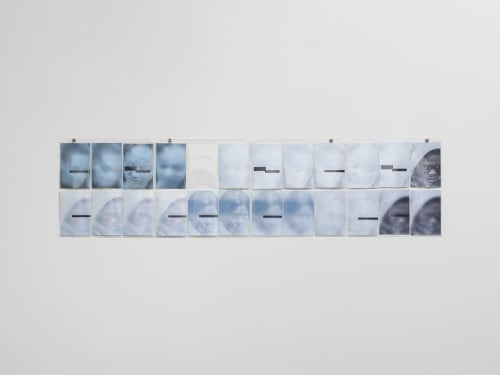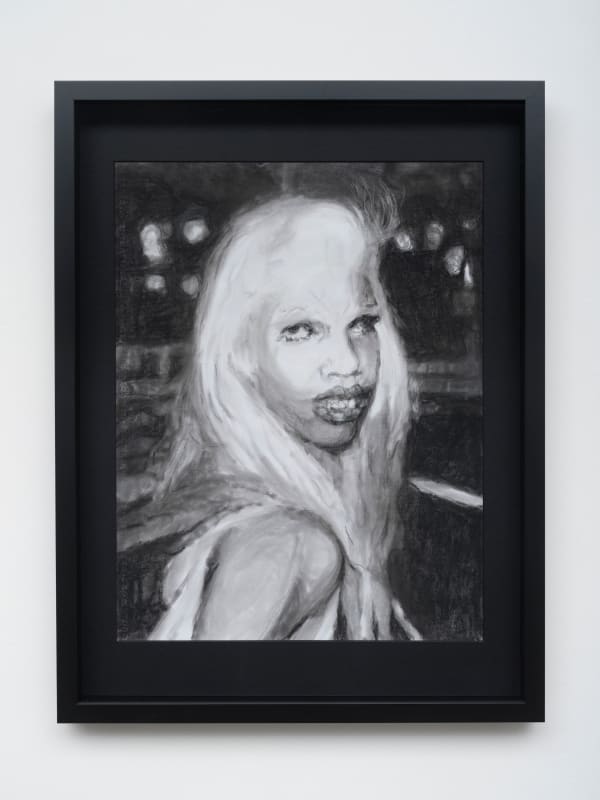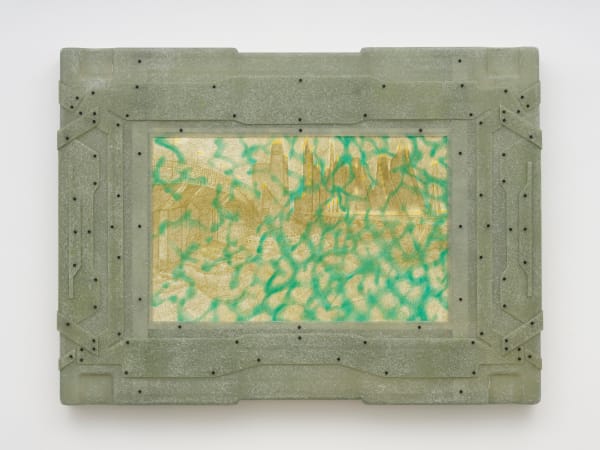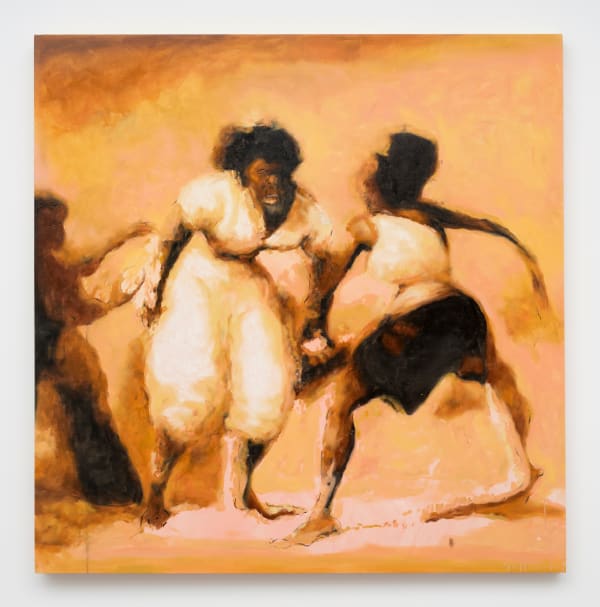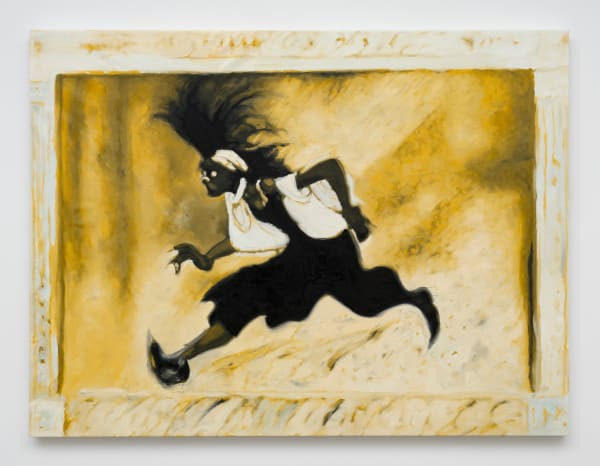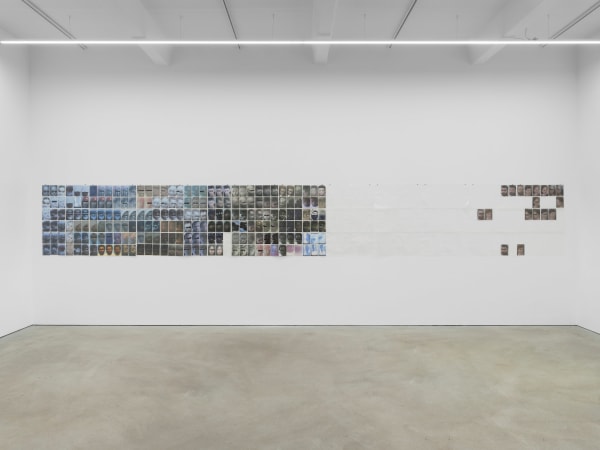NEXUS: DAVIDE ALLIERI, ALLEN-GOLDER CARPENTER, TAÍNA CRUZ, THEODOULOS POLYVIOU
With distinctive individual practices that notably depart from a conservative use of mediums and materials, the positions on view at the gallery engage with topics revolving around the self, identity, space, and technology. In European contemporary scientific discourse, identity is not discussed as a solipsistic process but rather as the result of adaptation at the interface between the internal and the external. Self and identity are intrinsically linked to the spaces we inhabit, not only physical but often virtual, including the built environments that shape our experiences. Nexus creates an alternative space—an interconnected environment where the boundaries between actuality and fiction are blurred, resulting in distinct synthesized materialisations of both principles. The works on view further explore time, from the past to the present, projecting into the future. Describing connection of multiple elements ‘Nexus’ is a Latin word that is also employed as a given name for heterogeneous concepts, especially within the realms of science fiction, computing, government and law, philosophy and gaming.
DAVIDE ALLIERI’s work often begins with the architectural but quickly slips into the realm of the speculative and the fantastical, referencing the junction between real and imagined catastrophe. His drawings conjure apocalyptic visions, science fiction scenarios, and brutalist architecture, suggesting a world of defensive and protective constructions, reflecting on the passage of time and the haunting persistence of abandoned structures, while blending reality with a dystopian vision to explore themes of obsolescence and environmental change. Allieri presents a collection of fiberglass works that evoke a sense of futurism tinged with the nostalgia of science fiction franchises, serving as a meditation on the potential of architecture to embody both shelter and abandonment– reminiscent of archeological artifacts to be found in the future.
THEODOULOS POLYVIOU’s sculptures on view in the gallery constitute formal responses resulting from his speculative research project ‘Transmundane Economies (2022 - ongoing).’ The site-responsive video installation ‘A Palace in Exile (2024),’ a central piece from this series, is simultaneously premiering at Julia Stoschek Foundation in Berlin. While in the latter, CGI and digital technologies are his main tool, his sculptures repurpose construction and architectural elements directly associated with the actual Neo-Byzantine Archbishop’s Palace for the Church of Cyprus and its history. With his works, Polyviou opens a dialogue between contemporary political concerns of nationalism, (anti)colonialism, and the right to self determination, as well as how these crusades interact with each other. Situated within the broader context of Polyviou's exploration of the Church’s influence on Cyprus’s post-colonial identity, this work delves into the architectural and ideological structures that both unify and marginalize. The negative space of both sculptures on view at the gallery, expose the concealed sanctity of architecture, questioning how built forms can contain histories both visible and erased.
TAÍNA CRUZ considers New York City a formative influence on her curiosity and artistic practice. Exposure to the goth-punk scene inspired Cruz’s early works. Within Cruz’s newer work, space can be defined as interplay between urban environments and ephemeral structures such as spirituality, emotions and the internet, all of which frame her human experience. Her paintings rely on an interplay of light and shadow, figure and ground, to create a setting which is otherwise compositionally devoid. The figures in Cruz’s work are often isolated against undefined backgrounds, suspended in fields of negative space that suggest a tension between confinement and openness of incomplete forms and soft, blurred lines, where the figure is both present and slipping away, creating a ghost of a moment.
ALLEN-GOLDER CARPENTER’s work challenges our understanding of space by transforming social conventions into a form of architecture. Their work ‘Viewer vs. Subject: Projection + Boundaries’ is an invisible yet omnipresent structure that shapes the behavior and sense of self of the visitors. The multimedia performative installation presents both a physical and psychological barrier, emphasizing how norms of acceptability are enforced not only by institutions but also by our peers and communities. The work includes a photo wall of CCTV footage depicting alleged shoplifters on display in convenience stores, gas stations etc. in the US, exploring the dynamics of surveillance and public shaming while revealing deeper issues of social control, the criminalization of individuals through images and racism. When visitors ‘breach’ the ‘security fence ’in the gallery, their image is captured by a surveillance camera, censored, and publicly displayed as part of the second half of the photo installation. An accompanying iPhone sculpture continuously plays a video cycling through all the images from the photo wall. In the age of biometric technology, Carpenter suggests that we no longer own our image—it has become a commodity, captured, replicated, and stored by others, often without consent. Through the lens of surveillance, Carpenter examines the Black experience and societal power structures.
'The installation comes from a body of work that deals with the viewer / subject relationship, particularly as it relates to boundaries, transgression, and projection. When you see a picture of someone caught stealing, there’s an idea, a preconceived notion, that we are meant to project onto that image. And by placing the viewer on equal ground as the person in the image I ask people to investigate in themselves, the ideas we project onto others. Alongside the boundaries of individuals being dissolved in an act of public shame.
The question at the heart of this body of work is, How do we betray others as well as ourselves in order to participate in society and keep it functioning in its current state?'
-Allen-Golder Carpenter
Nexus is curated by Sigrid Hermann
DAVIDE ALLIERI (b. 1982 in Bergamo) lives and works in Milan. Allieri’s practice spans drawing, sculpture, and installation, often navigating the spaces between these mediums to explore real and fictional architectures and worlds. Central to his work is the concept of the mold, which he further employs as a technique, creating a narrative form that evolves from a container into a habitat. For Allieri, the negative space within the mold is as significant as the emergent form itself, offering a matrix of ‘ideological negative space,’ where the mold transcends its role as a mere replicable form and becomes an archetype for a personal mythology. This transformation embodies a shift from the container to the content, as the mold becomes a spectral negative, a remnant of something that has disappeared.
Recent exhibitions include Triennale di Milano (2024, solo, upcoming); Kraupa-Tuskany Zeidler, Berlin (2024); Kunstraum Memphis, Linz (2024); Galerie Hubert Winter, Vienna (2023, solo); HOUSE, Berlin (2023); Palazzo Monti, Brescia (2023, solo).
ALLEN-GOLDER CARPENTER (b. 1999, Washington DC), lives and works in Washington DC. Carpenter is a gender non-conforming interdisciplinary artist, designer, poet, and author whose work explores the multifaceted nature of identity and its interaction with the world. Carpenter's practice spans various media, integrating images and found objects to delve into the dynamic interplay between hip hop culture and the judicial system, censorship, and personal identity.
Carpenter’s work has been exhibited at Kraupa-Tuskany Zeidler, Berlin (2024); Kunsthalle Recklinghausen (2024); No Gallery, New York (2024, solo); HOUSE, Berlin (2023); Galerie Kandlhofer, Vienna (2023, solo); Housing Gallery, New York (2023); von Ammon, Washington D.C. (2022, solo) amongst others.
TAíNA CRUZ (b. 1998, New York) lives and works in New Haven. Cruz’s work explores themes related to world building and folklore, visual and cultural history as well as identity. Her practice traverses a range of mediums, encompassing sculpture, painting, and video. Her distinctive visual language emerges through the manipulation of digital imagery, a process that involves altering photographs and visual material from her own expansive digital archive. Her paintings provoke deeper reflections on the ways in which digital technologies are reshaping our understanding of self and society, often in a humorous way, further challenging and redefining traditional representations of Black womanhood.
Recent exhibitions include Kraupa-Tuskany Zeidler, Berlin (2024); MoMA PS1, New York (2023); Kraupa-Tuskany Zeidler, Berlin (2023, solo); Studio Mondial, Berlin (2023); Martos Gallery, New York (2023); Kraupa-Tuskany Zeidler, Berlin (2023); Housing Gallery, New York (2022, solo); Embajada, San Juan (2022, solo); Housing Gallery, New York (2021); New Release Gallery, Online (2020); The Gormley Gallery, Baltimore, (2020). Cruz received the GO-A: Goya Opportunity Award, San Juan, Puerto Rico (2019) and was featured on the MICA Dean's List 2016-2020, Baltimore, United States of America (2020).
THEODOULOS POLYVIOU (b. 1989, Cyprus) is a Berlin-based artist who works with expanded and immersive media to consider the place of queer bodies within institutional spaces, cultural and political narratives, and the digital realm. His ongoing project ‘Transmundane Economies’ deploys virtuality and associated digital technologies to study, reconstruct, and fill voids in Cypriot cultural heritage, avoiding a nationalist agenda to speculate instead on the relationship between queerness, repair, and reinvention within the historical entanglements of the island. Polyviou’s practice explores how the complex configurations formed between material culture and new and immersive technologies, generates new information and experiences, and renegotiates existing systems of value against the backdrop of shifting political, technological, and spiritual conditions.
Theodoulos Polyviou’s work has been exhibited and screened at Kraupa-Tuskany Zeidler, Berlin (2024); Julia Stoschek Collection, Berlin and Dusseldorf (2024, solo); Fondazione Elpis, Milan (2024, solo); Bode Museum, Berlin (2024, solo); Chiesa di San Remigio, Florence (2023); Künstlerhaus Bethanien, Berlin (2022, solo); ZKM, Karlsruhe (2022); Haus N, Athens (2019; solo) amongst others.
-
 Nexus, exhibition view, Kraupa-Tuskany Zeidler, Berlin, 2024
Nexus, exhibition view, Kraupa-Tuskany Zeidler, Berlin, 2024 -
 Nexus, exhibition view, Kraupa-Tuskany Zeidler, Berlin, 2024
Nexus, exhibition view, Kraupa-Tuskany Zeidler, Berlin, 2024 -
 Nexus, exhibition view, Kraupa-Tuskany Zeidler, Berlin, 2024
Nexus, exhibition view, Kraupa-Tuskany Zeidler, Berlin, 2024 -
 Nexus, exhibition view, Kraupa-Tuskany Zeidler, Berlin, 2024
Nexus, exhibition view, Kraupa-Tuskany Zeidler, Berlin, 2024 -
 Nexus, exhibition view, Kraupa-Tuskany Zeidler, Berlin, 2024
Nexus, exhibition view, Kraupa-Tuskany Zeidler, Berlin, 2024 -
 Nexus, exhibition view, Kraupa-Tuskany Zeidler, Berlin, 2024
Nexus, exhibition view, Kraupa-Tuskany Zeidler, Berlin, 2024 -
 Nexus, exhibition view, Kraupa-Tuskany Zeidler, Berlin, 2024
Nexus, exhibition view, Kraupa-Tuskany Zeidler, Berlin, 2024 -
 Nexus, exhibition view, Kraupa-Tuskany Zeidler, Berlin, 2024
Nexus, exhibition view, Kraupa-Tuskany Zeidler, Berlin, 2024 -
 Nexus, exhibition view, Kraupa-Tuskany Zeidler, Berlin, 2024
Nexus, exhibition view, Kraupa-Tuskany Zeidler, Berlin, 2024
-
 Taína Cruz, Night out, 2024
Taína Cruz, Night out, 2024 -
 Theodoulos Polyviou, Dogmatic negatives (Column I) , 2024
Theodoulos Polyviou, Dogmatic negatives (Column I) , 2024 -
 Davide Allieri, LOST IN THE SHELL (series), 2024
Davide Allieri, LOST IN THE SHELL (series), 2024 -
 Taína Cruz, Encounter, 2024
Taína Cruz, Encounter, 2024 -
 Taína Cruz, Catch me, 2024
Taína Cruz, Catch me, 2024 -
 Davide Allieri, LOST IN THE SHELL (series), 2024
Davide Allieri, LOST IN THE SHELL (series), 2024 -
 Allen-Golder Carpenter, Viewer vs. Subject: Projection + Boundaries, 2024
Allen-Golder Carpenter, Viewer vs. Subject: Projection + Boundaries, 2024 -
 Theodoulos Polyviou, Temporary paschal stand No.2, 2024
Theodoulos Polyviou, Temporary paschal stand No.2, 2024 -
 Davide Allieri, TX9KD-Pod Seat, 2023
Davide Allieri, TX9KD-Pod Seat, 2023 -
 Davide Allieri, TX9KD-Pod Seat, 2023
Davide Allieri, TX9KD-Pod Seat, 2023 -
 Davide Allieri, LOST IN THE SHELL (series), 2024
Davide Allieri, LOST IN THE SHELL (series), 2024 -
 Allen-Golder Carpenter, Untitled, 2024
Allen-Golder Carpenter, Untitled, 2024

